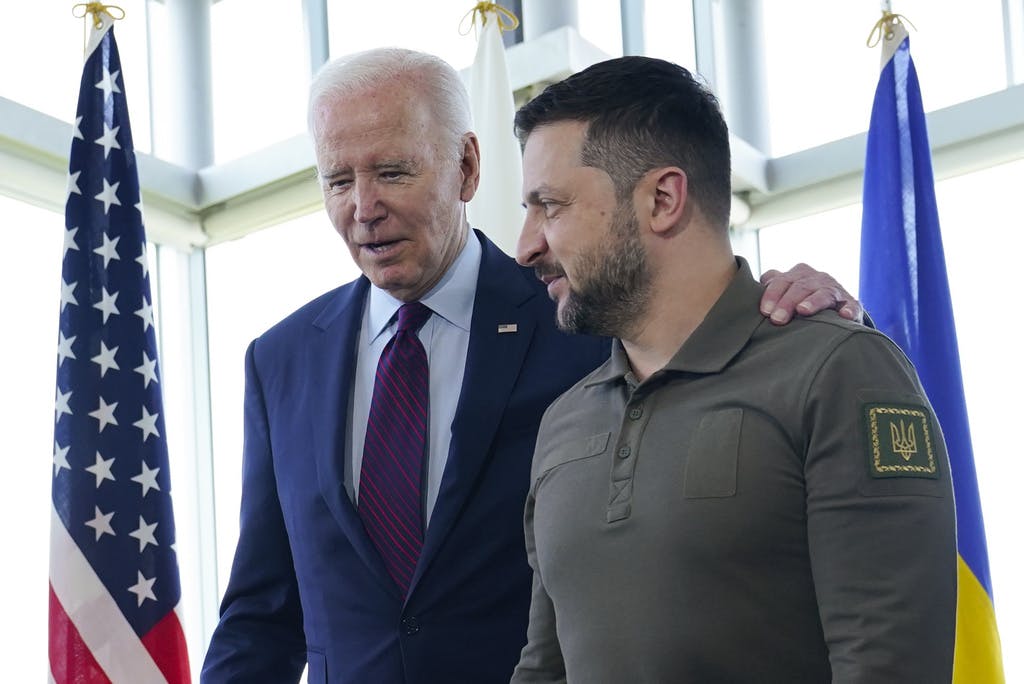Biden Officials Say Ukrainian Forces Should Focus on Country’s South, Though Russia Is Once Again Eyeing the North
Are mixed messages from Washington hampering Ukraine’s three-month-old counteroffensive?

Secretary Kissinger once warned that if America fails to protect its ally Preisdent Thieu of Vietnam, the word could go out that “it may be dangerous to be America’s enemy, but to be America’s friend is fatal.” Today, Ukraine’s friendship with America is shaping up as highly confusing, especially when it comes to getting help from President Biden.
All the more troubling that Biden administration officials are, according to a new report, saying that Ukraine’s troops are too dispersed and need to buckle down in the south, along the counteroffensive’s main front.
The problem is that the Ukrainian army’s general staff is increasingly convinced that Russia is about to step up attacks in the north. That assessment might seem counterintuitive given that Ukraine has been in control of Kharkiv, the country’s second-largest city, for more than a year. Kharkiv, though, still comes under intermittent Russian fire and is less than an hour’s drive from the Russian border.
Kyiv officials, according to Ukrainian social media and European press reports, believe that President Putin wants to establish a buffer zone six to nine miles deep inside Ukrainian territory extending from Chernihiv, which is north of Kyiv, over to Sumy and above Kharkiv itself.
Moscow’s motivation in doing so would be, according to an Ukrainian intelligence officer who spoke to Italy’s Corriere della Serra, to distract and divert troops fighting in the south and pave the way for a second-wave invasion of Ukraine’s north in the future. In that context, the Russian missile strike on a theater at Chernihiv, in which seven people were killed and 144 injured, does not seem quite so random.
The forecast for more Russian military moves from the north reflects dynamics on the ground that seem to be escaping some military strategists at Washington. The uptick in Ukrainian drone strikes in Russia’s Belgorod region, for one thing, is no accident. On Wednesday alone, a fresh drone strike killed three Russian civilians there — collateral damage, possibly, as Ukraine works overtime to keep malign Russian maneuvers in that border region in check.
All of this is no joke, even if President Zelensky did recently joke that Ukraine could “exchange Belgorod for our membership in NATO.” And no doubt American military planners mean well when they say, as the New York Times first reported, that “Ukraine’s grinding counteroffensive is struggling to break through entrenched Russian defenses in large part because it has too many troops, including some of its best combat units, in the wrong places.”
Many are of course in the right places, such as along the southern, Black Sea-facing side of the country close to Melitopol and Berdyansk where, also, Russian forces are deeply entrenched. But slicing through those Russian lines, with air support or without, will be anything but easy.
For the unnamed American officials quoted in the Times, Ukrainians should be prepared to lose more soldiers and equipment in that process. Not all Ukranians, though, agree with that tack, and at the end of the day it is Ukrainian soldiers, not policymakers, who must bear the brunt of combat casualties.
Sending mixed messages is counterproductive to any kind of military campaign, but in recent weeks doing so has emerged as something of a Joe Biden specialty. Little wonder that economist and Columbia University professor Jeffrey Sachs just said what many have been thinking: namely, that “Biden, unfortunately, is not a very smart person, and his team is not very smart.”
For Mr. Sachs, President Obama was “smarter than Biden” because he understood that Washington’s pressure on Moscow with respect to Ukraine and NATO would be met by a backlash, unspecified as it was. For everyone else, the maelstrom of misdirection emanating from the Biden administration simply invites more propounding on the best course of action in Ukraine.
Seemingly out of left field — or, not to put too fine a point on it, right field — and with President Macron still on vacation, the former French head of state, President Sarkozy, is weighing in on matters. In his new book, “It’s Fighting Time,” Mr. Sarkozy writes that Ukraine should become a neutral state and join neither the EU nor NATO.
The feisty Frenchman’s advice met with disapproval from Ukraine’s envoy to Paris, Vadym Omelchenko. Mr. Biden’s lack of leadership and conflicting assessments from some of his own staff members simply invite more cooks into the policy kitchen, from former French leaders to influence-thirsty Saudi Arabia.
In any case, the argument can be made that despite an unmatched level of aid. Washington is not doing enough to tip the odds in Ukraine’s favor right now. It would not be much of a stretch to think that some officials at Kyiv are too polite to say so.

